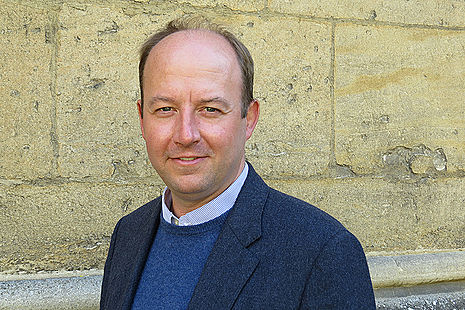Nick Timothy: “I thought we were going to win that election very comfortably”
Emyr Davies speaks to Theresa May’s Joint Chief of Staff, Nick Timothy, about Brexit, Windrush, and his disbelief at losing a parliamentary majority in the 2017 General Election.

“We need to recognise the familiarity in one another.” In most interviews this would be an unremarkable statement. But it’s surprising coming from the mouth of Nick Timothy, former Downing Street Joint Chief of Staff, who has been described by colleagues as ‘rude, abusive, and childish’. Theresa May appointed Timothy to the role in July 2016, following her election as Conservative Party leader and Prime Minister. He quickly earned the nickname ‘the Brummie Rasputin’ among some Tory MPs, allegedly bent on controlling political developments from behind the scenes. He even sported a Rasputin-esque beard to suit.
Now, as he appears in front of me via Zoom, he is wildly unrecognisable. Gone is the infamous facial hair. Seemingly, too, his caustic personality has mellowed. In fact, he sounds more like a pupil of the Barack Obama School of Rhetoric. “We need to be very careful not to undermine our sense of commonality,” he says, “because commonality is what leads to trust and that is a very precious thing that we mustn’t lose.” This doesn’t seem like a man who allegedly clocks up political enemies for fun. Then again, he lashed out against former colleague Phillip Hammond – “the best possible advertisement for abolition of the House of Lords” – only a day before our interview. Maybe commonality and trust will have to wait, after all.
This said, Timothy certainly wants to shrug off his reputation as Downing Street puppet master. A staunch Brexiteer, he denies that he pressured Theresa May (who campaigned to remain in the European Union before the referendum) to adopt her ‘red lines’ on Brexit. “It wasn’t like that,” he is quick to say. “When the country voted to leave, I think she was disappointed. But she was quite quick to move on.”
On whether May genuinely believed her proposed deal would be good for the UK, Timothy is less certain. “I’m not sure anybody will really know that apart from her. But what I can say is, in that first year in Downing Street, she was pretty convincing in telling ministerial colleagues and advisors that her idea of Brexit was to leave the EU’s institutions and laws in full. In the campaign, I remember the speech she gave, where she said, ‘There’s no point in pretending the sky will fall in if we do leave’.”
With talk of Brexit underway, the 2017 General Election is the elephant in the Zoom meeting room. Timothy’s tenure in Downing Street came to an abrupt end in June 2017 as May lost her Parliamentary majority. The already herculean task of getting a Brexit bill past MPs was complicated, and Timothy was forced to resign. One Tory MP delighted that ‘Rasputin is gone. There is a god’.
He admits the election result was a shock. “I don’t think anybody in central office, me included, thought we were going to lose the majority.” Timothy knew the campaign “wasn’t going well” but, even on the day of the election, his “expectation was that we were going to win very comfortably”. “I think it was a surprise to everyone,” he smiles wryly. I sense that, still, he cannot quite believe the outcome.
Who does he blame? “There were so many factors.” He takes some responsibility, including for the manifesto, which he says “blew up”. “There were also events during the campaign where we didn’t respond so well, like the terror attacks and the NHS cyber-attacks”.
Timothy has a long and amicable history with Theresa May, having worked as her special advisor at the Home Office between 2010 and 2015, and before that as her parliamentary staffer in 2006. I ask whether he blames her at all for the election result.
“She was a poor campaigner and communicator – on broadcast in particular.” Timothy also emphasises her indecisiveness, claiming she took “too long to decide to go for the election” which meant “it ended up being called too late”. And “there was ambiguity about the chain of command” he says, presumably a reference to his domineering opposite, Joint Chief of Staff Fiona Hill, and the Australian electoral strategist, Lynton Crosby. “We were basically running two contradictory campaign strategies, which is never a good idea.”
For all this talk of failure, it’s easy to forget that the Conservatives made important inroads during the 2017 election. The party’s share of the manual-worker vote rocketed from the previous election, setting the scene for the collapse of the red wall in 2019. Certainly, I sense that Timothy feels hard done by. “If you’d said to us before the campaign, ‘You’re going to get forty-two to forty-three per cent of the vote and two-and-a-half million more votes than David [Cameron] got in 2010,’ we’d have said – ‘oh yeah, it’s a landslide’.”
The Conservatives were, he suggests, in some ways a victim of their own success, undermined by their considerable lead in the opinion polls going into the campaign. “A lot of people voted Labour out of a sense of fear that the Tories were going to get a really big majority. They’d already assumed we were going to win the election.”
On immigration controls, Timothy is less forthright. Is he proud of Theresa May’s record on immigration? “There should be some control. And how you go about building control is a matter for policy debate. There are many different ways of doing it.” These are hardly the bold statements made by Theresa May – “The aim is to create, here in Britain, a really hostile environment for illegal immigrants” – when Timothy was advising her at the Home Office. Meanwhile, he calls the Windrush Scandal “very bad” but says it was “a bureaucratic cockup and misunderstanding” rather than “done for callous or nefarious reasons”.
Timothy’s political reputation is in rather bad repute, especially after the election defeat, but he retains some optimism. He talks proudly of “trying to reform stop and search laws – to stop the unfair targeting of young black men in particular”. He doggedly emphasises that “we made progress on this. It is important context to understand”. Indeed, Timothy attempted a return to national politics in 2019, standing for selection as a Conservative candidate in the General Election. Like it or loathe it – and some Tory MPs will loathe it – the Brummie Rasputin hasn’t thrown in the towel just yet.
 Comment / The (Dys)functions of student politics at Cambridge19 January 2026
Comment / The (Dys)functions of student politics at Cambridge19 January 2026 Arts / Exploring Cambridge’s modernist architecture20 January 2026
Arts / Exploring Cambridge’s modernist architecture20 January 2026 Theatre / The ETG’s Comedy of Errors is flawless21 January 2026
Theatre / The ETG’s Comedy of Errors is flawless21 January 2026 Features / Exploring Cambridge’s past, present, and future18 January 2026
Features / Exploring Cambridge’s past, present, and future18 January 2026 News / Local business in trademark battle with Uni over use of ‘Cambridge’17 January 2026
News / Local business in trademark battle with Uni over use of ‘Cambridge’17 January 2026










